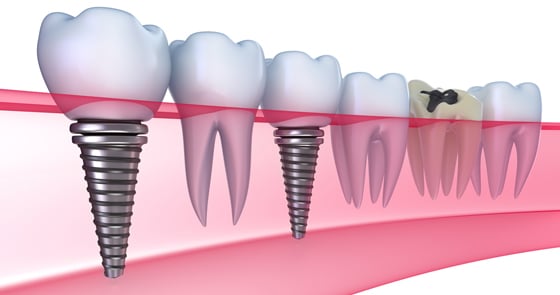For those with missing teeth, dental implants can bring back the joy of simple activities such as eating and chewing food with ease and comfort. But what should you look out for and think about before replacing that missing tooth? Here’s a list of 10 things to consider before having dental implants.
- Don’t rush into implant treatment
- Implant treatment require careful planning and thorough discussion between patient and specialist.
- All these planning and discussion require time.
- Find out if other options that does not require implants can be considered
- Discuss if technology will be used to ensure the safety of implant treatment
- There are many technological advances that can be applied to ensure that the implant treatment is safe.
- Technological advances like the use of low-dose in-office 3-dimensional CT scan need to be used to avoid placement of implants into nerves and other important structures.
- Low dose radiation is also important and the latest digital x-ray machines produce lower dose of radiation compared to older machines.
- Computer planning software can be used to better predict the final outcome of the implant treatment even before the surgery
- Lasers can be used for certain procedures to reduce post-op discomfort
- Microscope and fine instruments can also be helpful in reducing post-op discomfort
- Discuss the implant brand and type of crown material to be used
- Reputable implant manufacturers produce components that have been tested in research and have been functioning for decades. Hence, patients should always choose implant components from reputable implant manufacturers that have a long history because these components have stood the test of time.
- Some materials used for the crown are stronger and should be used in the back teeth. However, some materials are more aesthetically appealing and should be used in the front teeth.
- Take time to discuss if the bone, gum and other teeth are healthy enough for implants to be placed
- The specialist should check if the bone, gum and other teeth are healthy enough before implant treatment.
- If the bone and gum at the implant site are not healthy or sufficient, the addition of bone and gum may be required. It is only by doing that, can the implants be safely placed to ensure their longevity.
- The patient’s other teeth and gums should not be infected. If decay and gum infections are not treated first, the infection can spread to the implant sites.
- Find out if the dentist has relevant post-graduate qualifications
- Implant training is not done in most undergraduate programme.
- Some structured post-graduate training in implant dentistry is necessary.
- Regular attendance of lectures and hands-on course is important for constant upgrading of the specialist’s skills and knowledge.
- Ask to see before and after photos of work performed by the dentist
- Before and after photos of work performed by dentist will provide an idea of the possible final outcome.
- These photos can also be used to gauge the dentist’s experience in the specific clinical situation.
- Discuss the cost of treatment after you have thoroughly understood the various treatmentoptions
- After a comprehensive examination and discussion of the various treatment options, find out the reason for the high or low cost of treatment.
- Difference in implant brands, materials used and the specialists’ skills and experience will account for the difference in treatment fees.
- Be aware of potential failure of implants
- As with all procedures in medicine and dentistry, not all implant procedures will be fail-proof.
- In general, the success rate of implants is about 90-95%
- Discuss the post-treatment maintenance regime
- After the completion of implant treatment, there should be plan for the maintenance of the implant and the teeth.
- Implants function just like natural teeth, and like natural teeth, infections can occur around the implants if they are not regularly checked and cleaned.
- Seek a second- or third-opinion if you are still doubtful
- Always seek a second- or third-opinion if in doubt because different specialists may be able to provide different options for consideration.
Author: Dr Ang Chee Wan
